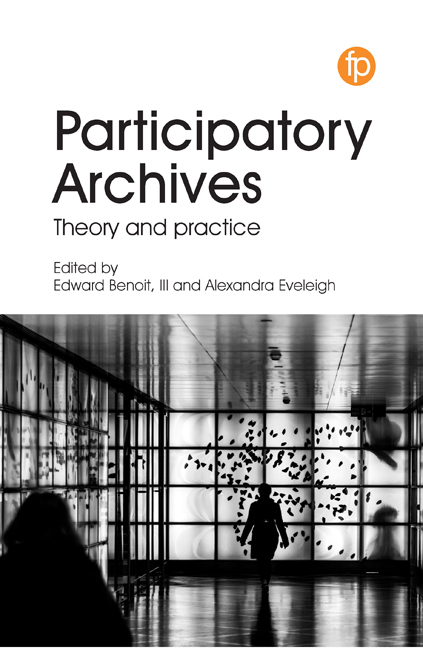Book contents
- Frontmatter
- Contents
- Figures and table
- Notes on contributors
- 1 Defining and framing participatory archives in archival science
- SECTION 1 SOCIAL TAGGING AND COMMENTING
- SECTION 2 TRANSCRIPTION
- SECTION 3 CROWDFUNDING AND OUTREACH
- SECTION 4 ALTERNATIVE AND ACTIVIST COMMUNITIES
- 14 Degrees of mediation: a review of the intersectionality between community and participatory archives
- 15 Activist participatory communities in archival contexts: theoretical perspectives
- 16 Documenting a social movement in real time: the Preserve the Baltimore Uprising 2015 archive project
- 17 Community partnerships and collection development in the Legacy of Ahmed Project
- 18 Challenges, opportunities and future directions of participatory archives
- Notes
- Index
18 - Challenges, opportunities and future directions of participatory archives
from SECTION 4 - ALTERNATIVE AND ACTIVIST COMMUNITIES
Published online by Cambridge University Press: 25 October 2019
- Frontmatter
- Contents
- Figures and table
- Notes on contributors
- 1 Defining and framing participatory archives in archival science
- SECTION 1 SOCIAL TAGGING AND COMMENTING
- SECTION 2 TRANSCRIPTION
- SECTION 3 CROWDFUNDING AND OUTREACH
- SECTION 4 ALTERNATIVE AND ACTIVIST COMMUNITIES
- 14 Degrees of mediation: a review of the intersectionality between community and participatory archives
- 15 Activist participatory communities in archival contexts: theoretical perspectives
- 16 Documenting a social movement in real time: the Preserve the Baltimore Uprising 2015 archive project
- 17 Community partnerships and collection development in the Legacy of Ahmed Project
- 18 Challenges, opportunities and future directions of participatory archives
- Notes
- Index
Summary
As seen in the previous chapters, the term ‘participatory archives’ encom - passes a wide range of archival approaches, with some grounded in new technologies and others adaptations of more traditional approaches. While this volume is divided into distinct sections, the discussions therein highlight the often overlapping nature of participatory archives – innovative and traditional, expanding and reinforcing archival theory, digital and analogue, and sui generis and heterogeneous. Participatory archives cannot, therefore, be reduced to a single entity or type. They must be viewed in their totality as multiple dimensions of a broader movement of engagement.
The literature reviews note the rapid development of the field since the mid-2000s while demonstrating archives’ adaptation to contemporary and interdisciplinary trends. The theoretical analysis chapters ground the participatory movement within historical archival theory and note where and how it challenges the ideas and concepts at the heart of the archival endeavour, including questioning the role of the archivist since the postmodern turn. Finally, the case studies provide rich examples of partici - patory archives highlighting their origins, development, implementation and lessons learned along the way. The following sections summarise the major challenges and opportunities noted in the case studies and discuss the future directions for participatory archives.
Challenges and opportunities
The case studies included in this volume highlight many of the challenges and opportunities associated with the range of participatory archives. Although each project is unique, particular themes emerge when examined as a whole. For example, the projects all involve some aspect of collaboration. Likewise, each of the case studies stresses the importance of planning, outreach and remaining flexible, since there are no codified best practices. Finally, challenges of sustainability and technological requirements quickly rise within participatory projects. We explore this commonality and themes from across the chapters below.
Collaboration
Participatory archival projects require some degree of collaboration. At a minimum, an archive (traditional or community-based) engages with the public (in general or a specific community) in a joint effort to further the archive's mission. However, these projects are not simple, they require complex relationships and often encounter pitfalls along the way. For example, Greenhorn highlighted the difficulties in building trust between indigenous communities and governmental institutions that had betrayed their trust historically (Chapter 4).
- Type
- Chapter
- Information
- Participatory Archives , pp. 211 - 218Publisher: FacetPrint publication year: 2019
- 1
- Cited by



